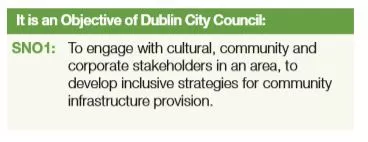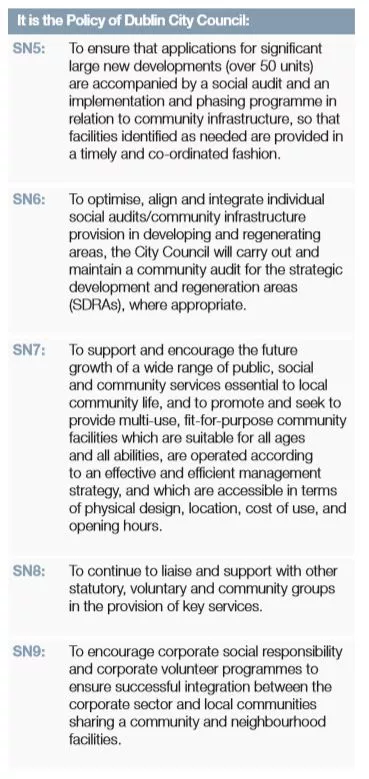12.5.3 Neighbourhoods and Supporting Infrastructure
12.5.3 Neighbourhoods and Supporting Infrastructure
The importance of supporting infrastructure to underpin successful neighbourhoods and sustainable communities is now a long established and central tenet of government policy. The DEHLG’s Developing Areas Initiative, 2007 focused on securing a holistic and partnership approach to the integrated delivery of hard and soft infrastructure. It identified key physical and social infrastructure determinants and sought the integration of housing and essential supporting social infrastructure.
The ministerial guidelines, ‘Sustainable Residential Development in Urban Areas’ (2009) reinforces the central objectives of the Developing Areas Initiative. Similarly, the ‘Manual for Local Area Plans’, 2013 provides guidance on the provision of community projects, facilities and services, stating that it is essential these are rolled out in advance or in tandem with development.
Dublin City Council will use development management phasing mechanisms positively and will liaise with relevant stakeholders and agencies to secure strategic infrastructure in the key developing areas, as identified in the core strategy. The Council will also give consideration to the quantitative requirements for a range of facilities as well as guidance or criteria on the qualitative aspects of community infrastructure, such as design and layout, as part of the local plan-making process.
A range of community facilities and infrastructure will be essential to support the emergence of sustainable neighbourhoods and communities throughout the city, especially in newly emerging or developing areas.
The delivery and sustainable funding of such infrastructure will be a key focus of the City Council with consideration of innovative mechanisms including strategic partnerships with the private sector, as well as government and state agencies, and implementation through the development management process.

